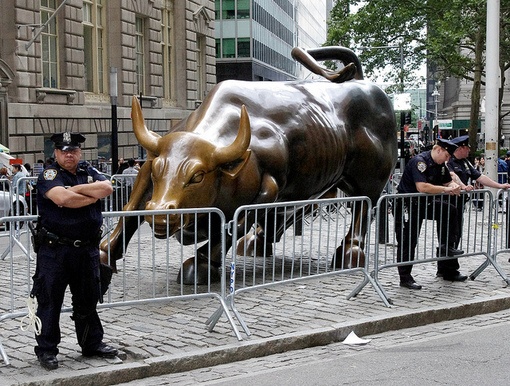“Having therefore no foreign establishments, either colonial or military, the ships of war of the United States, in war, will be like land birds, unable to fly far from their own shores. To provide resting places for them, where they can coal and repair, would be one of the first duties of a government proposing to itself the development of the power of the nation at sea.”
-Alfred Thayer Mahan
Trump’s pick for secretary of the Navy, private equity investor and former military intelligence officer Philip Bilden, has withdrawn his name from consideration.
Bilden said in a statement, “I have determined that I will not be able to satisfy the Office of Government Ethics requirements without undue disruption and materially adverse divestment of my family’s private financial interests.” Oh, those pesky financial interests.
Earlier this month, Trump’s pick for Army secretary, the former chairman of the New York Mercantile Exchange, Vincent Viola (a man worth close to $2 billion), withdrew his nomination as well. Viola, like Bilden, accumulated his obscene wealth in the world of casino capitalism. Without doubt, the merger of finance capital and the military industrial complex has never been more visible than during the Trump Era.
Bilden, the son of a naval officer, was valedictorian of his graduating class. In 1982, he was awarded an Army ROTC scholarship and attended Georgetown University, where he studied International Politics and graduated magna cum laude, a proper pedigree indeed.
In 1986, Bilden won Georgetown’s W. Coleman Nevils Award for U.S. Diplomatic History for his paper on Alfred Thayer Mahan, one of the most important military theorists of the 19th century.
Mahan, the son of a professor at the United States Military Academy, commanded several warships as an officer for the Union Army during the American Civil War, but his naval skills were sub-par, as several of his vessels were involved in crashes. In typical military fashion, as a result, Mahan was appointed as a lecturer at the U.S. Naval War College in Newport, Rhode Island (where Bilden happens to own a $6.4 million mansion).
In 1890, Mahan wrote The Influence of Sea Power Upon History, 1660-1783, which, at the time, was widely considered to be the most influential book on military ideology, theory and strategy since Carl von Clausewitz’s 1832 work, On War.
The main thrust of Mahan’s work was the idea that supreme naval power was at the core of any “successful empire.” While Mahan admired the Roman Empire, it was the British Empire’s navy that served as the greatest influence for Mahan. Building on the British example, Mahan believed that “a strong navy and commercial fleet is a necessity.” He also believed that blockades and battleships were key to naval dominance.
Mahan’s influence was wide. Theodore Roosevelt, America’s unabashed imperialist, first met and befriended Mahan in 1888, when Mahan was President of the Naval War College. Teddy admired Mahan’s military strategies and expansionist ideologies. Mahan, a social darwinist and rabid racist, found a sympathetic ear and friend in Roosevelt.
Mahan’s vision of a U.S. Empire in the Pacific and Caribbean was realized by Teddy in the form of Pearl Harbor, a vital military outpost, and the Panama Canal, an essential development for U.S. business and military hegemony. By the early part of the 20th century, the intertwining of commercial and military interests, especially at sea, was finally complete.
Fast-forward 117 years: today, the President of the United States is a self-proclaimed “pussy-grabbing” billionaire who has surrounded himself with military generals and business executives. Bilden is just the latest in a long line of millionaires and billionaires who will frequent the Trump White House. According to many scholars, Trump’s cabinet is the wealthiest in U.S. history.
Rex Tillerson, former CEO of Exxon Mobile, runs the State Department, which, in many ways, is nothing new. Oil interests have been essentially running the State Department for decades. General James “Mad Dog” Mattis, a war criminal, is the Secretary of Defense, which in many ways is also nothing new: war criminals have always frequented the halls of the Pentagon.
However, the fact that business executives and military generals no longer require middle-men to negotiate their interests should worry anyone interested in living in a quasi-democratic society.
Right-wing media figures such as Stephen Bannon and Alex Jones have a direct line to the White House and America’s version of the royal family jet-sets across the globe, entertaining world leaders and managing The Donald’s multi-billion dollar business empire, while Trump manages Uncle Sam’s crumbling empire.
Indeed, after 15 years of the War on Terror, including the longest war in U.S. history (Afghanistan), the elephant in the room remains U.S. Empire.
The U.S. will either follow the path of the Roman Empire, or the path of the British Empire after WWII. If the U.S. chooses to replicate the actions of the overly confident, extremely stratified and decadent Romans (which seems to be the case), it will collapse and the result will be global chaos on an unimaginable scale.
On the other hand, if the U.S. chooses the path of the British Empire, it may be able to maintain some level of democracy and decency. Without effective anti-imperialist movements, both at home and abroad, this option remains off the table.
